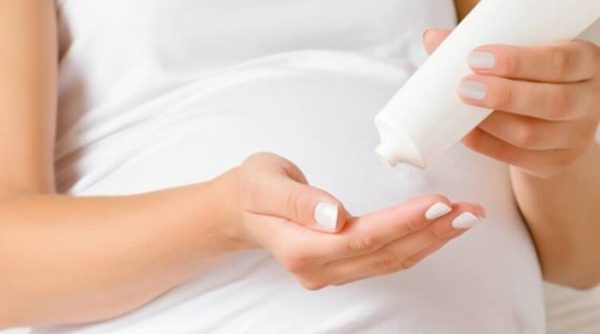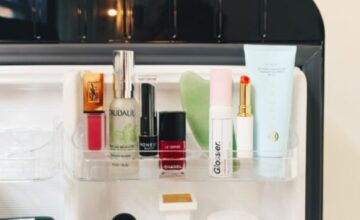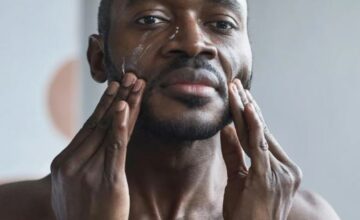
Having a beauty routine while pregnant is not bad but you should also pay close attention to the ingredients in the products you use.
Some ingredients found in some beauty and skincare products have been proven to be unsuitable for a pregnant woman so it’s advisable to be well informed so as to be on the safe side or better still, consult your doctor.
Here are 9 popular ingredients you should avoid according to dermatologists.
1. Retinol/Retinoids
Retinol or Retinoids have become a holy grail in the skincare routine of many women.
Retinol, an animal-derived vitamin A, is added to skincare products helps boost collagen production which rejuvenates the skin and slows down the aging process. It also reduces fine lines and wrinkles, fights acne and other pigment issues.
Found in Retin-A and Accutane, retinoids are prescription acne and anti-aging medications. It may also be listed on ingredient labels as retinoic acid, retinyl palmitate, retinaldehyde, adapalene, tretinoin, tazarotene, and isotretinoin.
Research has however shown that the use of retinoids can lead to an increased risk of birth defects for developing babies. Most doctors warn patients not to get pregnant if they’re using these medications. But if you do get pregnant, stop taking retinoids immediately.
2. Formaldehyde
This chemical is most commonly found in hair-straightening treatments, nail polish, and eyelash glue. Experts warn that formaldehyde is a carcinogen and could increase chances of miscarriage. Though the cause is unknown, the agency recommends avoiding products that contain formaldehyde during pregnancy.
Other formaldehyde-releasing chemicals commonly found in cosmetics with a similar potentially dangerous effect include the following:
- bronopol
- DMDM hydantoin
- diazolidinyl urea
- hydroxymethylglycinate
- imidazolidinyl urea
- quaternium-15
- 5-bromo-5-nitro-1,3-dioxane
3. Salicyclic acid
Salicylic acid is a common ingredient to treat acne due to its anti-inflammatory and exfoliating capabilities. A 2013
study has however concluded products that deliver a high dose of salicylic acid such as peels and oral medications should be avoided during pregnancy.
4. Hydroquinone
This is a skin-lightening agent found in both over-the-counter and prescription products; it’s typically used to treat pigment issues like melasma. Since melasma often appears for the first time during pregnancy, hydroquinone however isn’t advised for pregnant women.
Research shows that Hydroquinone has a high rate of systemic absorption, meaning it can be absorbed through the skin and enter the bloodstream (and your milk, if you’re nursing).
5. Benzoyl peroxide
Pregnancy often causes hormonal acne, however, using skin products with an active ingredient like benzoyl peroxide has been proven to pose some possible risk to the fetus.
6. Chemical sunscreens
Sunscreen is a very important skincare product, but especially during pregnancy, it’s important to pay closer attention to which type of formula you choose. Oxybenzone and its derivatives are the most frequently used ultraviolet (UV) filters in sunscreens.
However, because oxybenzone is a known endocrine-disrupting chemical, the concern for use in pregnancy is that it could disrupt hormones and cause permanent damage to mother and baby.
To be on the safe side, stick to mineral ingredients like zinc oxide and titanium dioxide.
7. Parabens
A common preservative in cosmetics, parabens offer two distinct concerns: they are known hormone disruptors and are easily absorbed into the skin. According to a 2016 study, prenatal exposure to BPA (a type of paraben) has been linked to breast cancer as well as affecting the reproductive system.
8. Essential oils
Although natural, essential oils should be used with caution during pregnancy, says a dermatologist. The agents they contain have small molecular weight and high volatility, so they may affect the body as a whole.
According to her, many essential oils increase the skin’s sensitivity to UV, which isn’t great considering the risk of pigmentation is higher during pregnancy.
Talk to your doctor first before using any essential oils during your pregnancy and make sure to limit your exposure to a safe amount.
9. Phthalates
Phthalates are endocrine-disrupting chemicals found in many beauty and personal products. In animal studies, serious reproductive and hormone dysfunction has been linked to phthalate exposure.
Cosmetics is the top source of phthalate exposure, and the most common phthalate you’ll find in beauty products is diethylphthalate (DEP).




